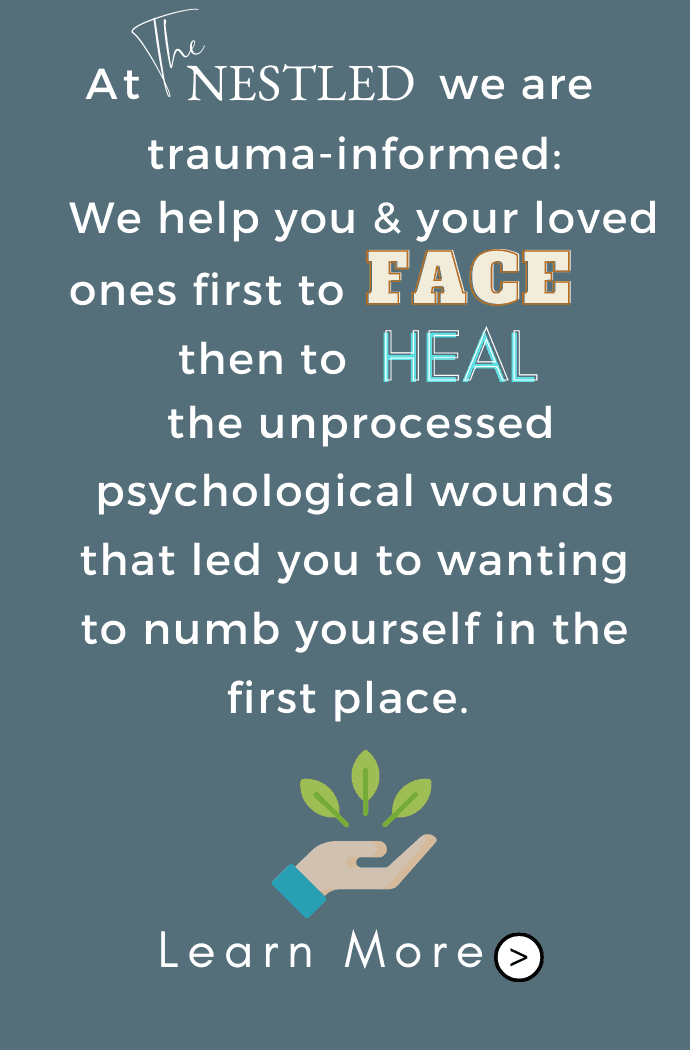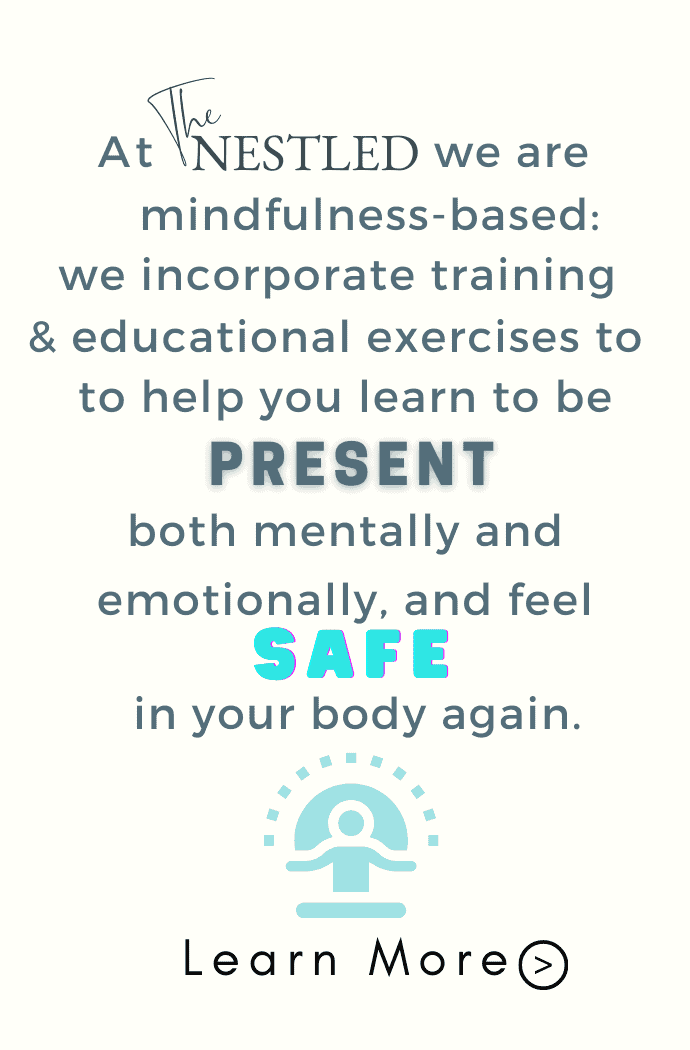Substance abuse and addiction are serious issues that can impact people from all walks of life, including military personnel and veterans. Substance abuse can have serious consequences for those who have dedicated their lives to serving their country, and it is important to provide support and resources to help them overcome addiction and address any underlying mental health issues.
According to the National Center for Health Statistics, more than 1,500 people die per week from taking some type of opioid. From 2011 to 2021, fatal overdoses from clandestinely produced fentanyl and fentanyl analogs, and law enforcement encounters have increased. In March 2022, the fatalities of drug overdoses over a 12-month period reached an estimated number of 110,360 deaths. Nearly 20 million veterans live in the United States, representing about 10% of the population according to PEW research substance use disorder rates amongst veterans are higher than the civilian population.
Military veterans have to deal with the stigma surrounding substance use disorder as well as expectations to be a leader which can make it more difficult to receive help. Military veterans have to deal with issues that result from their service like chronic pain, PTSD, and re-integration into civilian life which make substance abuse more prevalent amongst veteran populations.
Data & Statistics on Substance Abuse Disorders and Mental Health Issues in Active Duty Military Personnel
Substance abuse is a significant issue among military personnel, both active duty and veterans. While the United States only has about 1 million active service members, there are over 19 million veterans living in the country, comprising about 10% of the total population. Although not all military personnel struggle with substance abuse, heavy drinking is a common problem among active duty members, and many veterans also face challenges that may lead them to consider using drugs or alcohol once they are no longer in active service.
Veteran drug overdose mortality, 2010-2019
- Overall Trends (2010-2019): Age-adjusted overdose mortality rates increased 53.2% among Veterans and 79.0% among non-Veterans.
- Veterans’ Rates: Age-adjusted rates of overdose mortality among Veterans rose from 19.8/100,000 in 2010 to 32.6/100,000 in 2017, before falling to 30.3/100,000 in 2019.
- Synthetic Opioids & Psychostimulants: Despite the decrease from 2017 to 2019 in overall overdose mortality, rates of overdose deaths involving synthetic opioids other than methadone and involving psychostimulants continued to increase through 2019.
- Comparison with Non-Veterans (2019): Overdose mortality was lower for male Veterans than male non-Veterans (standardized rate ratio (SRR) = 0.81, 95% confidence interval (CI): 0.77-0.84).
- VHA Use Among Veterans: Among male Veterans, rates were higher in all years for those with recent Veterans Health Administration (VHA) use than those without (2019: SRR=1.69, 95% CI: 1.56-1.83). Overdose mortality rates increased faster among female Veterans without VHA use than those with VHA use.
- Conclusions: From 2015 onward, Veteran men experienced lower age-adjusted overdose rates than non-Veteran men. While overall rates of Veteran overdose deaths declined from 2017 to 2019, rates involving psychostimulants and synthetic opioids continued to rise.
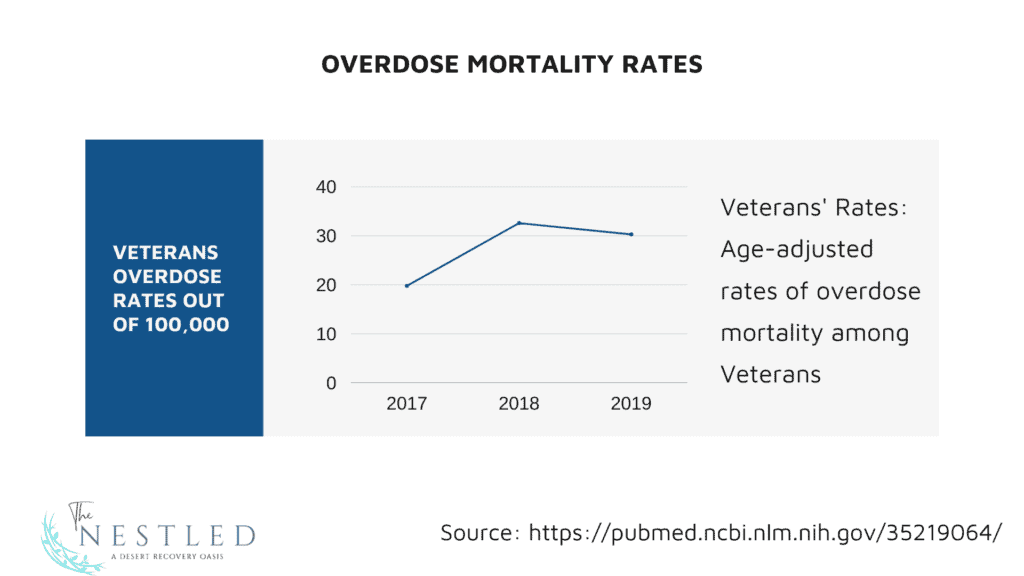
Military Veteran Addiction Statistics
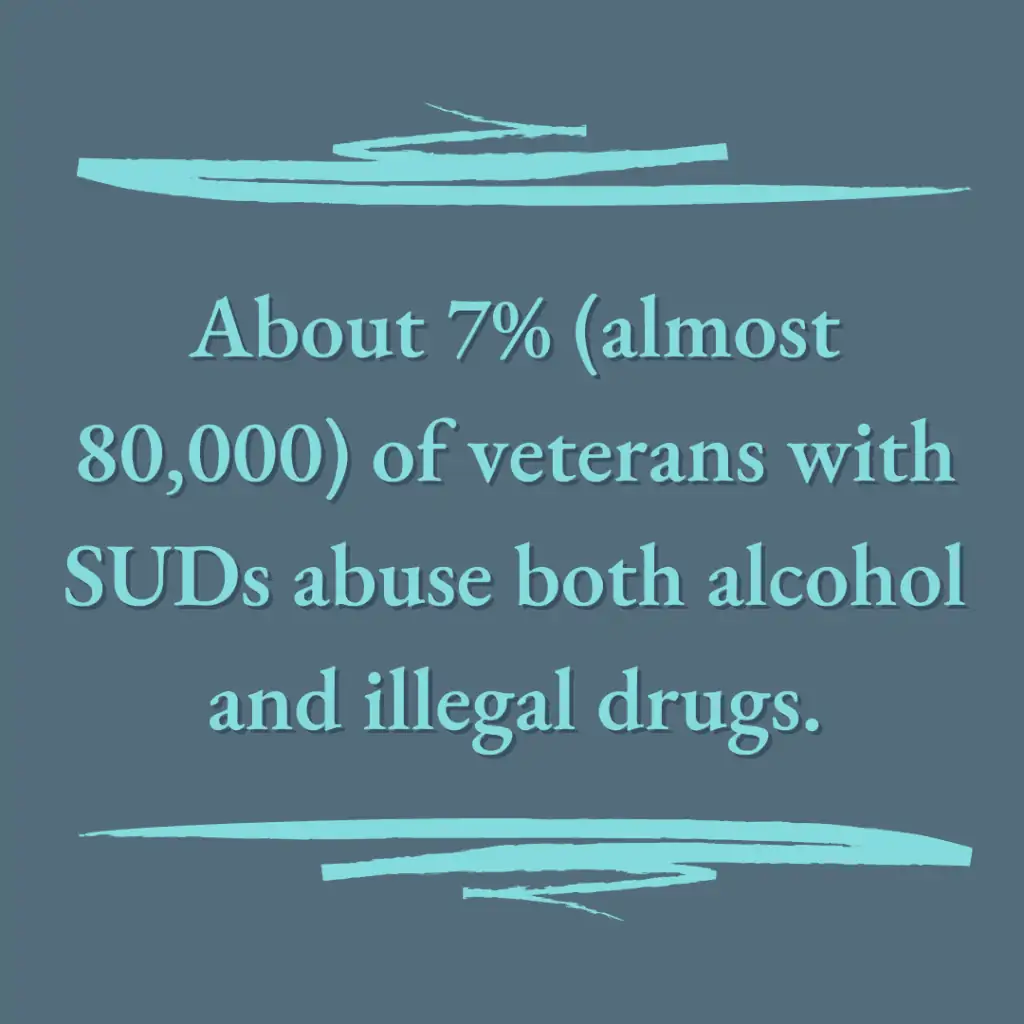
- Approximately 11% of veterans who visit a medical facility run by the Department of Veterans Affairs (VA) for the first time have a substance use disorder (SUD).
- More than 80% (nearly 900,000) of veterans with SUDs abuse alcohol.
- Nearly 27% (about 300,000) of veterans with SUDs abuse illegal drugs.
- About 7% (almost 80,000) of veterans with SUDs abuse both alcohol and illegal drugs.
- Military veterans who struggle with substance abuse are three to four times more likely to be diagnosed with a mental health issue than those who do not misuse substances.
- Alcohol is the primary substance for 65% of veterans entering treatment centers—nearly twice the rate of civilians.
- Male veterans are more than twice as likely to be diagnosed with an alcohol use disorder (AUD) than female veterans.
- Opioid abuse is a significant problem among veterans, with one study finding that 13% of veterans who received opioids for pain management developed an opioid use disorder.
- Veterans are more likely to misuse prescription drugs than non-veterans, with one study finding that 23% of veterans who received prescription opioids misused them.
- Methamphetamine abuse is also a concern among veterans, with one study finding that 8% of veterans seeking substance abuse treatment reported methamphetamine use.
- Substance abuse among military personnel and veterans is linked to an increased risk of violence and involvement in criminal activity.
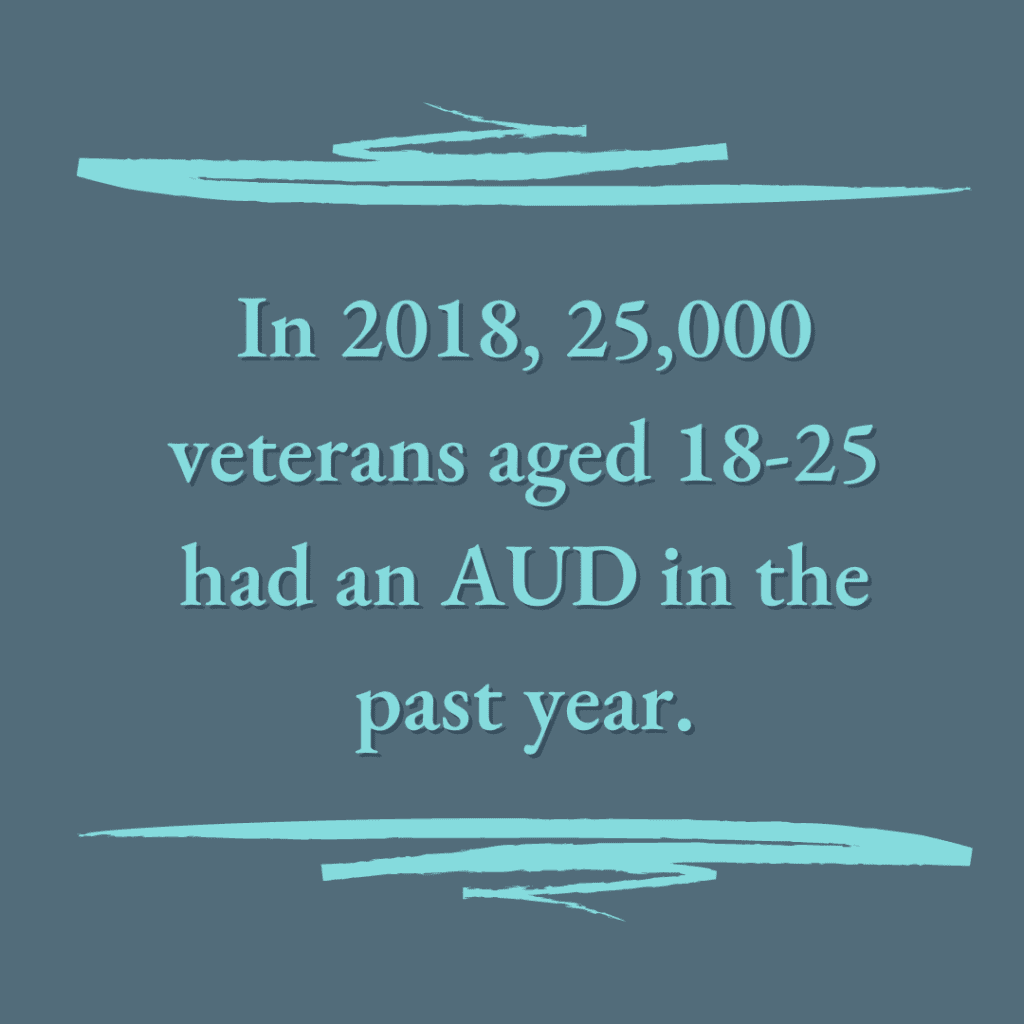
- Substance abuse among veterans is associated with a higher risk of homelessness.
- Substance abuse among veterans is linked to an increased risk of self-harm and suicide.
- Substance abuse can strain relationships with family and friends and lead to difficulties at work or in finding employment.
- Veterans with substance abuse disorders are more likely to suffer from physical health problems, including liver disease.
- Substance abuse can worsen mental health problems or lead to the development of new mental health issues among veterans.
- Substance abuse treatment programs that address co-occurring mental health disorders and underlying trauma are more effective at helping veterans recover from addiction.
- Support from loved ones and the community can be an important factor in recovery from substance abuse among veterans.
Nevada
- Suicide Rates Among Veterans: Nevada’s military veterans are dying from suicide at alarming rates. The specific statistic provided is that one veteran in Nevada kills himself or herself every 2.75 days. Nationally, 22 veterans a day are committing suicide.
- Women Veterans and Military Sexual Assault: Women Veterans are at an estimated 10 times higher risk of military sexual assault and resulting mental health issues than male Veterans.
- Suicide Prevention Efforts: There is a need for prevention services, including access to drug rehab in Nevada.
- Medical Marijuana Cards: A recommendation was made by the VA to extend the expiration on Marijuana Medical Cards from one to four years, but no specific numerical data was provided regarding how many veterans this might affect.
Veterans Struggling With PTSD
According To Google Trends Data An Increase In Search Volume for PTSD As it relates to Veterans and former Ex-Serviceman Has Shown a 180% Spike In Volume

Post-traumatic stress disorder (PTSD) And The Link Between Addiction
Post-traumatic stress disorder (PTSD) is a leading cause of veteran substance abuse, and many veterans who seek treatment for substance use disorders also struggle with PTSD. In fact, more than two out of every ten veterans with PTSD also have some form of alcohol or drug addiction. Military veterans who struggle with substance abuse are three to four times more likely to be diagnosed with a mental health issue than those who do not misuse substances. Substance abuse among veterans is often linked to the use of drugs like heroin, cocaine, marijuana, and synthetic opioids. It’s important to recognize that substance abuse is not limited to younger age groups among veterans, and Substance abuse among military personnel and veterans is a significant concern.
Substance Abuse Challenges Among Military Personnel & Retired Veterans
Substance abuse can have serious consequences for those who have dedicated their lives to serving their country, and it is important to provide support and resources to help them overcome addiction and address any underlying mental health issues. Some potential consequences of substance abuse among military personnel and veterans may include:
- Difficulty readjusting to civilian life
- Relationship problems and strain on personal relationships
- Loss of employment or difficulty finding and maintaining employment
- Health issues, including physical and mental health problems
- Financial difficulties
- Increased risk of violence and involvement in criminal activity
- Increased risk of self-harm and suicide
Frequently Asked Veteran Addiction Statistic Questions
-
I'm A Veteran, Is the VA the only option I have for Addiction Treatment?
As a veteran, you have a number of options for addiction treatment, including the VA (Department of Veterans Affairs). The VA offers a range of services for veterans struggling with substance abuse. However, it is important to note that the VA may not be the best fit for everyone and that there are other treatment options available.
At The Nestled Recovery Center in Las Vegas, we offer comprehensive addiction treatment specifically tailored to the needs of military personnel and veterans. Our team is dedicated to helping individuals overcome addiction and address any underlying mental health issues they may be facing.
-
How does treatment differ for veterans?
Treatment for veterans may differ in a number of ways, depending on the specific needs of the individual. Some veterans may have experienced trauma or other mental health issues as a result of their military service, and treatment may need to address these issues in addition to substance abuse. Treatment may also take into account the unique challenges and stressors that veterans may face, such as adjusting to civilian life or dealing with the effects of deployment.
-
Are there specialized treatment programs available for veterans?
Yes, there are a number of specialized treatment programs available specifically for veterans. These programs may be offered through the VA or through private treatment centers and may include therapies and support services tailored to the needs of military personnel and veterans. Some specialized programs may also offer additional support for issues such as post-traumatic stress disorder (PTSD) or traumatic brain injury (TBI).
-
How Many Veterans Are Addicted To Drugs?
Substance abuse among veterans is not limited to alcohol, as many also struggle with addiction to drugs like opioids, methamphetamine, and other illicit substances. The opioid epidemic has had a particularly significant impact on veterans, as many are prescribed powerful opioid medications to manage chronic pain related to injuries or other health conditions. The overuse or misuse of these medications can lead to dependence and addiction, and veterans may also turn to illegal opioids like heroin when prescription drugs are not available. After leaving the military, veterans are more likely to fall victim to the dangers of drug addiction. Some statistics on drug abuse among veterans include:
-
- In 2018, about 300,000 veterans abused illegal drugs.
-
- Opioid abuse is a significant problem among veterans, with one study finding that 13% of veterans who received opioids for pain management developed an opioid use disorder.
-
- Veterans are more likely to misuse prescription drugs than non-veterans, with one study finding that 23% of veterans who received prescription opioids misused them.
-
- Studies have found that 11% of veterans in the United States have been diagnosed with a substance use disorder, which is slightly higher than the percentage seen among those in the general population.
-
- Methamphetamine abuse is also a concern among veterans, with one study finding that 8% of veterans seeking substance abuse treatment reported methamphetamine use.
-
-
How Many Veterans Become Alcoholics?
Alcohol abuse and binge drinking are common among active-duty military personnel, and this behavior may continue and turn into alcoholism after separating from the service. Veterans who abuse alcohol are at greater risk of experiencing or committing violence, suffering from negative health consequences and having a shorter lifespan. Some key statistics on alcohol abuse among veterans include:
-
- Alcohol is the primary substance for 65% of veterans entering treatment centers, nearly twice the rate of civilians.
-
- Male veterans are more than twice as likely to be diagnosed with an alcohol use disorder (AUD) as female veterans.
-
- In 2018, 25,000 veterans aged 18-25 had an AUD in the past year.
-
- In 2018, 874,000 veterans aged 26 or older had an AUD in the past year.
-
Strategies For Addressing Substance Abuse Among Veterans
It’s crucial to recognize the unique challenges faced by military personnel and veterans and to provide them with the support and resources they need to overcome addiction and address any underlying mental health issues. Comprehensive treatment approaches, which address co-occurring mental health disorders and underlying trauma, are important in helping veterans recover from substance abuse. Support from family, friends, and the community can also be an important factor in recovery. There are a variety of resources available for veterans seeking treatment, including the Department of Veterans Affairs (VA) and community-based organizations.

Finding Treatment Resources As A Military Veteran
The Nestled Recovery Center in Las Vegas is dedicated to providing support and resources to military personnel and veterans struggling with substance abuse. Our team is dedicated to helping these individuals overcome addiction and address any underlying mental health issues they may be facing. Our comprehensive treatment approach includes a range of therapies and support services, including individual and group counseling, educational workshops, and access to resources. We understand the unique challenges faced by military personnel and veterans and are committed to providing a supportive and compassionate environment where they can begin their journey towards recovery.
Insurance Resources For Veterans With SUD
TriWest Healthcare Alliance is an organization that aims to provide healthcare services to military and Veteran populations in the western United States. If you or a loved one is a veteran or military member seeking medical treatment, TriWest may be able to offer convenient and affordable healthcare. To learn more about TriWest and how to apply for coverage, check out our comprehensive article on the subject.
Final Thoughts On Veterans And Addiction
According to the National Institute on Drug Abuse (NIDA), veterans are more likely than civilians to have experienced traumatic events, which can lead to an increased risk of substance abuse and addiction. In addition, veterans are more likely to be prescribed opioid pain medications for chronic pain, which can lead to opioid addiction. Statistics show that veterans are twice as likely as civilians to die from accidental opioid overdoses. Furthermore, a study conducted by the Substance Abuse and Mental Health Services Administration (SAMHSA) found that almost one in ten veterans reported misusing prescription drugs in the past year. It is clear that addiction is a significant issue for veterans, and there is a critical need for effective and holistic addiction treatment options tailored to the unique needs and experiences of veterans.
Infographic Veterans And Substance Abuse
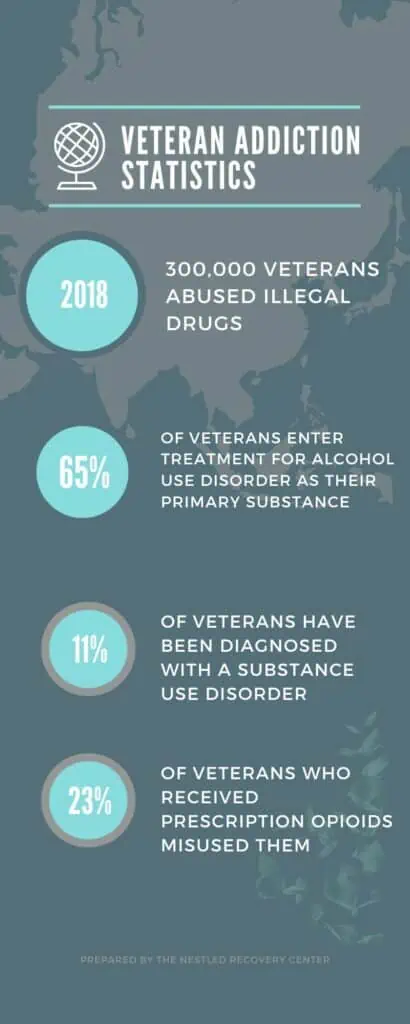
References:
- PTSD: National Center for PTSD. n.d. PTSD and Substance Abuse in Veterans. Retrieved from https://www.ptsd.va.gov/understand/related/substance_abuse_vet.asp on December 26, 2022
- NIDA. 2019, October 23. Substance Use and Military Life DrugFacts. Retrieved from https://www.drugabuse.gov/publications/drugfacts/substance-use-military-life on December 26, 2022
- Substance Abuse and Mental Health Services Administration (SAMHSA). 2020. 2019 National Survey on Drug Use and Health: Veteran Adults. Retrieved from https://www.samhsa.gov/data/sites/default/files/reports/rpt31103/2019NSDUH-Veteran/Veterans%202019%20NSDUH.pdf on December 26, 2022.
- Pain Management and the Opioid Epidemic: Balancing Societal and Individual Benefits and Risks of Prescription Opioid Use. Retrieved from https://www.ncbi.nlm.nih.gov/books/NBK458661/ on January 26, 2023



